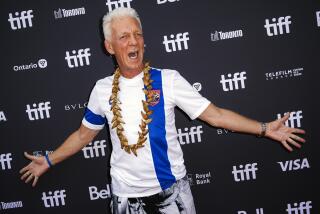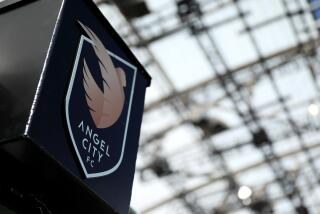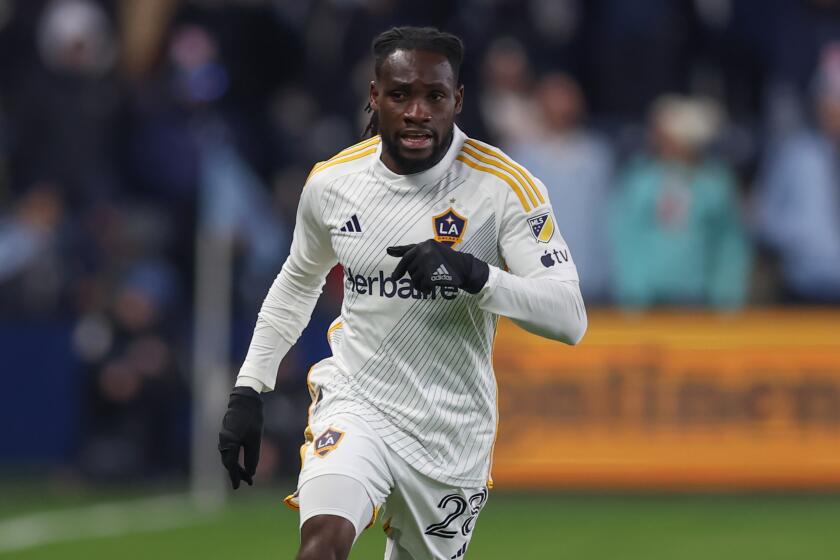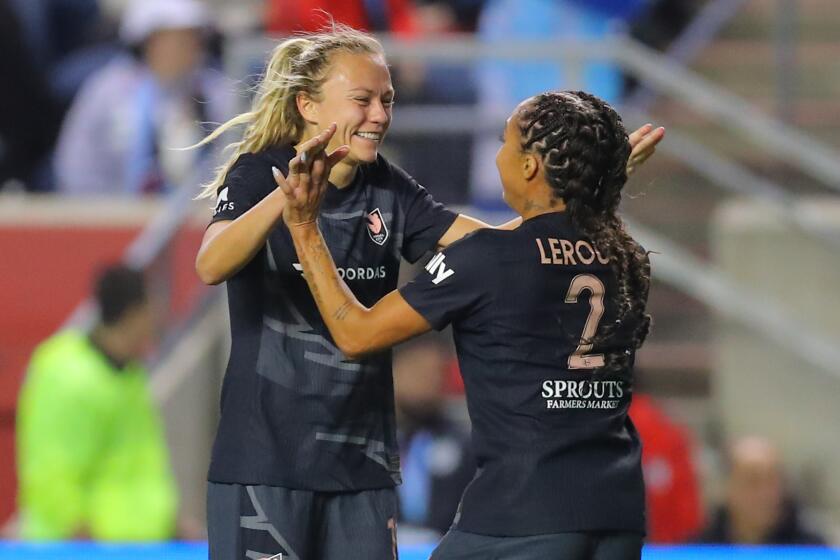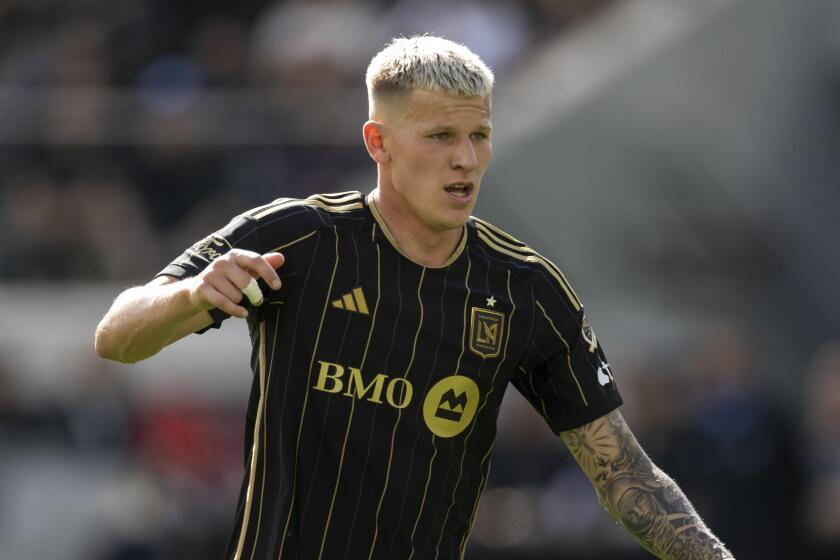Soccer Fans Kicking and Screaming About Takeover
Not to suggest that some Manchester United fans are unhappy, but the message on a placard here would be difficult to misconstrue. It read, “Glazer, watch your back!”
Ever since American sports baron Malcolm Glazer announced Monday that he had secured enough shares to take control of the most fabled name in British football, known as soccer in the U.S., supporters have been in an uproar. And supporters is probably too mild a word for the devotion some feel for the Red Devils.
For the record:
12:00 a.m. May 21, 2005 For The Record
Los Angeles Times Saturday May 21, 2005 Home Edition Main News Part A Page 2 National Desk 1 inches; 48 words Type of Material: Correction
Manchester soccer team -- An article in Thursday’s Section A about the reaction of fans in Manchester, Britain, to the takeover of their local football club by an American businessman said the team had won the “treble” of three championships in 1998. Manchester won the treble in 1999.
“He’s going to ruin it, isn’t he? It is all about money, all the riches in the world, everything. What can the fans do? He’s got full control. No matter what they do, what he says goes,” said Ian Diggle, 25, an elevator engineer in a hardhat working on a downtown street a few miles from Old Trafford, the fabled home of Manchester United.
The fans’ angst should get a full airing tonight, at a meeting in the Central Methodist Hall. One item for discussion is whether supporters should just walk away from Glazer’s Manchester United and launch a new club in the city, which some would like to call FC (Football Club) United.
“He needs the goodwill of the supporters, and he doesn’t have that,” said Sean Bones, vice chairman of Shareholders United, a 31,000-strong fans’ group that has turned vehemently against Glazer’s $1.5-billion acquisition of the club.
Bones charges that the massive loans the American tycoon took out to finance the deal will cost about $240,000 a day in interest, money that would have to be wrung out of the club in higher profits.
“Glazer won’t be given a chance to win the support of the supporters,” Bones said. “We will do every blocking we can to try to affect the revenue.”
One of the chief complaints against Glazer, the 76-year-old billionaire owner of the NFL’s Tampa Bay Buccaneers, is that he has not come to Manchester to face the skeptics. He apparently plans to hand over day-to-day management to his son Joel, who will be installed at the Old Trafford stadium headquarters. His statement that Joel is an “avid fan” met with derision on this side of the River Mersey.
Shareholders United’s first order of business, it says, will be to demonstrate at Saturday night’s contest in Cardiff, Wales, and then to encourage a boycott of the main corporate sponsors of Manchester United, including Nike and Vodafone.
Another even more extreme group, the Manchester Education Committee, has made veiled threats.
“It is our club, and we will be ruthless in protecting it. Our previous symbolic actions have been disregarded; we have no choice now but to act with our full capabilities,” said a statement issued before the deal was made final. It was signed, “In the spirit of the Red Army.”
Paul Hince, chief sportswriter for the Manchester Evening News, said the purchase of the club was understandable, because “as a money-making concern, the Old Trafford empire is just about as good as it gets.” Nevertheless, he said, he had grave misgivings about Glazer.
“A resident of Tampa Bay, Fla., he has no background in football and no feel for the traditions and history of the club he now owns. Has he heard of Duncan Edwards? Does he know what Munich means, other than that it’s a city in Germany? I very much doubt it.”
Alex Ferguson, longtime Scottish coach of the Red Devils, appealed to fans to support the team this Saturday night when it goes into the championship for this year’s FA Cup against Arsenal.
“Of course the fans are emotional. Given the loyalty they have shown over the years, it is understandable,” he said Wednesday. But he added: “Our focus has to be 100% on the final this week.... All the rest is peripheral.”
Truth be told, on the streets of Manchester, they are not exactly rioting, at least not yet. James Cunningham, 20, a salesclerk wearing a New York Yankees cap, said he was not bothered by the sale to Glazer, but recognized that some Man U fanatics might be.
“Hooliganism will come back,” he said. “It will get ridiculous, out of control.”
Taxi driver John Herin also said he was not bothered. “As long as he doesn’t mess it up, it might be a good thing,” he said. “At the end of the day, he’s not a fool, is he? He did not buy the team to destroy it. If he has the knowledge, and he can run it well, then why not?”
But that appears to be a minority view.
Peter Spencer, sports editor of the Manchester Evening News, describes fans’ upset as “totally beyond belief.”
He explains the attachment as a love for the Manchester United club’s tragedy-marked history and its up-from-adversity style of football -- “attacking, forceful, entertaining.”
An amble through the museum tucked into the bowels of the 68,000-seat stadium gives a feel for the reasons behind the devotion.
Manchester United has its roots deep in the 19th century working-class consciousness of this city, an industrial center of mills and factories since early Victorian days.
The team began life in 1878 as the Newton Heath Lancashire and Yorkshire Railway Cricket and Football Club, run by a local railway works.
When the club, which was formed by the dining room committee of the railway’s wagon works, was threatened with bankruptcy in 1902, it was rescued by a wealthy local brewer, John Henry Davies, who gave it the name Manchester United, adopted its red-and-white colors, rebuilt its personnel and constructed the first stadium at Old Trafford, the site that would become known as the “Theater of Dreams.” The playing field, the club’s third, opened in 1910 to a defeat by Liverpool, but the team recovered and prospered, going through the cycle of calamities and rebirths for the next 95 years that has been its trademark.
The worst moment, without doubt, was on Feb. 6, 1958, when the team, which had trail-blazed Britain’s entry into the European Cup competition against the wishes of the country’s football establishment, was nearly wiped out in a plane disaster in Munich, Germany, while trying to take off in a snowstorm.
Eight of its players died. The tragedy worked its way into the heart of not only Manchester, where hundreds of thousands lined the streets in tribute, but Europe and the world as well.
It was partly in remembrance of the crash victims that the club launched a remarkable comeback in the next decades, returning to win the European Cup in 1968, and becoming the only football club ever to win the treble in 1998: Premiership, FA Cup and European Cup champions all in one year.
A stupendous collection of first-place trophies fills the glass cases along a whole wall of the museum.
That history is what the fans here worry that Glazer does not understand.
“Our instinct is that it is probably a bad idea,” said Scott, 21, who did not want to give his last name because he works at the stadium, when asked about the purchase.
“Buying a club on a big loan that needs to be paid back, that rankles most people. [America] is a different culture. He said his sons are avid Manchester United fans, but we’re slightly suspicious. We haven’t seen them around.... If he had bothered to show up here, he might have quashed a few rumors about how he works.”
Just outside Old Trafford is Red Star Sports. Its proprietor, Angelo, who claims to be the oldest independent vendor of Manchester United memorabilia and souvenirs -- since 1952 -- said there is an attitude among the die-hard fans that the club should not belong to a country that does not love the game.
“My personal opinion is that the reason why so many fans are upset is because he’s American and they see Americans not giving a damn about football. If he was Irish or German or any European, they wouldn’t kick up a foot. But people know Americans don’t give two tosses about football.... Americans just see it as a game. It is not. It is a passion, a way of life.”
He said he would not take lightly the threats that some fans are making. “Those people mean it. We are the world’s largest army, in footballing terms, the Red Army.”
For people to think that Glazer has the club, he said, “It’s like their wife has been taken from them.”
